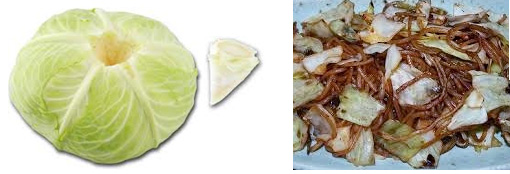I live with my husband and we share a common value of striving to live a “cultured” life. I think the definition of cultured living differs by person to person. My ideal cultured lifestyle places importance on such elements as “simplicity,” “comfort,” “freedom,” “sophistication,” and “eco-friendliness.”
Today in Japan, there are so many goods and materials around us. One would think it easy to live a simple and eco-friendly life, but it’s actually not. Recently, I’ve come to realize how difficult it is.
One day, my husband made yakisoba fried noodles for our lunch. The noodles were cooked with many slices of cabbage core – the very part I usually cut off and discard. The yakisoba had the distinct flavoring of cabbage, different from the usual but somewhat novel.

“Even the core of the cabbage is edible so there’s no reason to toss it out,” he said. Well, he was absolutely right. However, what my hubby did with the veggie struck me. As a housewife, I have thought discarding the cabbage core is a matter of course as I saw my mom, school teachers, and cooking experts on TV consistently cut off and tossed it out.
Then my husband explained what made him think like that. “I attended Zen meditation practices several years ago. You remember that, don’t you? I spent some weekends in a Zen temple where I experienced the life of a Zen monk.” I remember that he left Saturday morning and came home Sunday evening, extremely exhausted.
“From early morning we did zazen and routine tasks like cleaning inside the temple and the grounds. And then we had a meal. There are disciplinal manners at meal times…”

He says that Zen disciplinants’ way of eating leaves absolutely no waste. They dine using a set of five stacking bowls called jihatu and a pair of long chopsticks. They use the biggest bowl for cooked rice or porridge, the second biggest bowl for miso soup, and the rest of the bowls are for main/side dishes and takuwan pickles. They serve main/side entrees onto their bowls and pass the serving bowl to the person sitting next to them. At this time, they are supposed to serve their own portion taking into consideration how much others need. They must eat all they have, and talking or making sounds is prohibited. For those monks, meals are one of their practices – eating is partaking of lives – and they must concentrate on it.
After this experience, my husband says he changed his mind about eating and living. However, his room is not neatly organized at all…Well, anyway, we try to live a frugal life without extra possessions in accordance with the philosophy of Zen practice.
They say in Zen temples, monks don’t wash their dishes. They consume every bit of rice and other dishes except the very last bite of takuwan pickle. They pour hot water into the bowls, wipe them with the piece of takuwan, and drink the water. The bowls are then wiped with clean dry washcloth and stacked. Doing this with care prevents illness from food poisoning even without washing the bowls with water. This is an extremely ecological way of cleaning.
Ordinary people like us can’t live like those Zen monks for various reasons but I think we can learn much from the monks’ philosophies. For example, when having meals, we should enjoy the dishes in appreciation of the food and of those who made it. When washing dishes, avoid polluting the river by wiping the dishes with leftover oil using paper towel to reduce detergent use. Before dumping waste, sort trash in consideration of how the cleaning staff will treat it, and how it will be recycled or burned.
The bottom line is, caring matters. I think the care you take with things and people, your breadth of mind form our cultured living.
Reported by Yukari Aoike, Sugahara Institute
